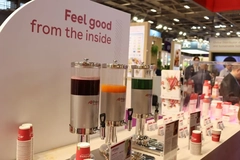Energy Drinks Linked With Increased Odds of Illicit Prescription Stimulant Medication Use

03 Apr 2014 --- Experts are calling for further research into the neurological effects of energy drink ingredients, particularly when mixed with prescription stimulants. The calls come in response to a recent study, which shows an association between the frequent consumption of energy drinks and an increased illicit use of prescription stimulant medications. The research also indicated some dangerous interactions between ingredients such as Ginseng and anti-depressant medications.
The study’s research team, which represents six American universities, published their research in Substance Abuse, the official journal of the Association for Medical Education and Research in Substance Abuse (AMERSA) and a publication from Routledge.
“This article includes a much needed review of the neurological effects of energy drink ingredients,” said the report’s primary author, Dr Conrad Woolsey. “It also provides practitioners with important information about the dangerous interactions that can occur when energy drinks are mixed with prescription stimulants or other pharmaceutical drugs,” he said. “Ginseng, for example, should not be mixed with anti-depressant medications or prescription stimulants because this can cause dangerously high levels of serotonin (i.e. serotonin syndrome), which is known for causing rapid irregular heartbeats and even seizures.”
In order to conduct the research, undergraduate and graduate college students from a large Midwestern university completed an anonymous, web-based survey asking questions about their patterns of energy drink consumption and prescription stimulant use (both legal and illicit use were measured). Using the responses of students who admitted using both energy drinks and prescription stimulants, the researchers found the estimated probability of illicitly using prescription stimulants ranged from approximately .15 for students not using energy drinks in the past 30 days to over .50 for those who reported using energy drinks every day during the past 30 days.
Based on results of respondents who indicated using both energy drinks and stimulant medications without a valid prescription, researchers found that the estimated probability of illicit prescription stimulant use increased significantly with each additional day of energy drink use in the past 30 days. For example, the estimated probability of illicit prescription stimulant use ranged from .15 for students who reported not using energy drinks during the past 30 days to over .50 for those who reported using energy drinks every day in the past month. Additionally, the number of days and energy drinks consumed per episode was also significantly higher (p<.005) among prescription stimulant users compared to non-users. Furthermore, all students with a valid prescription for stimulant medications reported mixing energy drinks with prescription stimulants, which is discouraged because of increased side effects and dangers.
Adolescents and young adults are at risk for developing dependency and problems with addiction to stimulants due to the high cognitive demands placed upon students, the increased use of energy drinks, the increased availability of prescription stimulants, and the initial euphoric feelings produced by stimulants, The neurological effects of energy drink ingredients, such as increased dopamine and serotonin, are similar to those caused by prescription stimulants. Energy drink ingredients like caffeine, inositol, taurine, and yohimbine hydrochloride also affect concentration, motivation as well as how we think, feel, and perform.
By Sonya Hook












